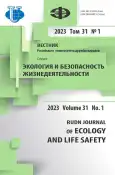Rewilding in megacities: from concept to implementation
- Autores: Fedorchenko L.Y.1, Bobkova A.A.1, Nikiforov A.I.1,2
-
Afiliações:
- Moscow State Institute of International Relations (University)
- Russian Federal Research Institute of Fisheries and Oceanography
- Edição: Volume 31, Nº 1 (2023)
- Páginas: 20-29
- Seção: Ecology
- URL: https://journal-vniispk.ru/2313-2310/article/view/323950
- DOI: https://doi.org/10.22363/2313-2310-2023-31-1-20-29
- EDN: https://elibrary.ru/RRGPJQ
- ID: 323950
Citar
Texto integral
Resumo
The expansion of urban agglomerations and the accompanying increase in the severity of environmental problems require special attention to ensure a comfortable urban environment. One of the ways to solve this problem is to create an ecological framework in the megacity, formed by quasi-natural biocenoses, created within the application of the concept of rewilding. This article reviews the main current trends and approaches to the implementation of rewilding; discusses positive and negative environmental effects of the transformation of urban ecosystems within rewilding; presents an analytical review of available techniques and options for rewilding in various megacities around the world.
Palavras-chave
Sobre autores
Leonid Fedorchenko
Moscow State Institute of International Relations (University)
Autor responsável pela correspondência
Email: leofedorchenko@icloud.com
Código SPIN: 1896-4918
3rd year student of the field of study “Ecology and Nature Management” 76 Vernadskogo Prospect, Moscow, 119454, Russian Federation
Arina Bobkova
Moscow State Institute of International Relations (University)
Email: olimp.arina@mail.ru
Código SPIN: 7032-8377
3rd year student of the field of study “Ecology and Nature Management” 76 Vernadskogo Prospect, Moscow, 119454, Russian Federation
Andrey Nikiforov
Moscow State Institute of International Relations (University); Russian Federal Research Institute of Fisheries and Oceanography
Email: nai@vniro.ru
ORCID ID: 0000-0003-3112-5378
Código SPIN: 5896-7947
PhD in Agricultural Sciences, Associate Professor; Russian Federal Research Institute of Fisheries and Oceanography; Department of International Complex Problems of Nature Management and Ecology, Moscow State Institute of International Relations
19 Okruzhnoy Proezd, Moscow, 105187, Russia; 76 Vernadskogo Prospect, Moscow, 119454, Russian FederationBibliografia
- Martin A. Taming rewilding-from the ecological to the social: How rewilding discourse in Scotland has come to include people. Land Use Policy. 2021;(111):105677.
- Pettorelli N. The policy consequences of defining rewilding. Ambio. 2022;51(1):93-102.
- United Nations. World population prospects 2019: department of economic and social Affairs. World Population Prospects 2019. 2019.
- Beatley T. Handbook of biophilic city planning & design. Island Press, 2016.
- Catalano C. Urban Services to Ecosystems. Springer International Publishing. 2021.
- Linder N. Pro-environmental habits: An underexplored research agenda in sustainability science. Ambio. 2022;51(3):546-556.
- Breuste J. The Green City: Urban Nature as an Ideal, Provider of Services and Conceptual Urban Design Approach. Springer Nature; 2021.
- Alexander S, Gleeson B. Rewilding the Suburbs: CERES as a Site of Enchantment. Urban Awakenings. Palgrave Macmillan, Singapore, 2020:199-209.
- Corlett RT. Restoration, reintroduction, and rewilding in a changing world. Trends in ecology & evolution. 2016;31(6):453-462.
- Josh Donlan C. Pleistocene rewilding: an optimistic agenda for twenty-first century conservation. The American Naturalist. 2006;168(5):660-681.
- Svenning JC. Science for a wilder Anthropocene: Synthesis and future directions for trophic rewilding research. Proceedings of the National Academy of Sciences. 2016;113(4):898-906.
- Pereira HM, Navarro LM. Rewilding european landscapes. Springer Nature, 2015:227.
- Morel L. Passive rewilding may (also) restore phylogenetically rich and functionally resilient forest plant communities. Ecological Applications. 2020;30(1):e02007.
- Mitsch WJ. What is ecological engineering? Ecological Engineering. 2012;45(5-12).
- Dumroese RK. Considerations for restoring temperate forests of tomorrow: forest restoration, assisted migration, and bioengineering. New Forests. 2015;46(5):947-964.
- Jacobs DF. Restoring forests: what constitutes success in the twenty-first century? New Forests. 2015;46(5):601-614.
- Root-Bernstein M, Gooden J, Boyes A. Rewilding in practice: projects and policy. Geoforum. 2018;97:292-304.
- Carver S. Rewilding through land abandonment. Rewilding. 2019:99-122.
- Des forêts urbaines bientôt sur quatre sites emblématiques. URL: https://www.paris.fr/pages/des-forets-urbaines-bientot-sur-quatre-sites-emblematiques-6899/ (accessed: 26.02.2022).
- Nowak DJ, Ogren TL. Variations in urban forest allergy potential among cities and land uses. Urban Forestry & Urban Greening. 2021;63:127224.
- Pawankar R, Canonica GW, Holgate ST, Lockey RF. World Health Organization. White Book on Allergy 2011-2012 Executive Summary.
- Stronen AV, Iacolina L, Ruiz-Gonzalez A. Rewilding and conservation genomics: how developments in (re) colonization ecology and genomics can offer mutual benefits for understanding contemporary evolution. Global Ecology and Conservation. 2019;17:e00502.
Arquivos suplementares









